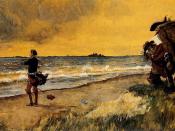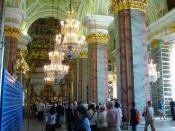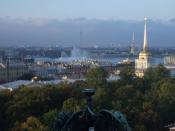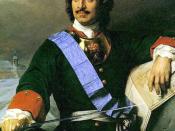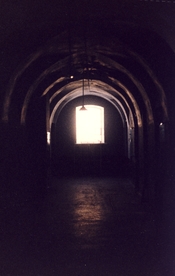Peter the Great forever changed Russia, after his reign Russia would never be the same. With his insight and vision for the need of a reformation and westernization of Russia, he attempted to make Russia one of the strongest nations in Europe. In 1682, ten year old Peter and his half brother, Ivan V, ascended to the throne as co-rulers of Russia. They came to power on the shoulders of the streltsy, guards of the Moscow garrison, who expected to be rewarded for their support (Kagan, Ozment, Turner 503). Peter was officially declared Sovereign of Russia when Ivan died in 1696 (Levykin). As a young boy Peter learned that the power of the tsar must be secured from the boyars and streltsy and that the military power of Russia must be increased (Kagan, Ozment, Turner 504).
Peter would go on to visit Europe to examine the latest technical advances and to recruit engineering and military experts for his services in Russia (AskJeeves).
This was the first time for a trip like such to be made by the tsar of Russia. Upon his return from Europe, Peter was determined to imitate that what he had seen and establish Russia as a worldwide power. Peter opened Russia to the West. He invited the best European engineers, shipbuilders, architects, craftsmen and merchants to come to Russia. Hundreds of Russians were sent to Europe to get the best education and learn different arts and crafts (CityVision). Peter created the first Russian navy and a regular army (Levykin).
Peter would tame the boyars and streltsy by forcing them to shave their long beards and shear off their long customary hand covering sleeves of their shirts and coats. He demanded that the nobles serve his state (Kagan, Ozment, Turner 505). He developed a system which would put the nobility into a state of service. This was called the Table of Ranks. The table equated a person?s social position and privileges with his rank in the bureaucracy or the military, rather than with his lineage among the traditional landed nobility. The streltsy attempted to rebel while Peter was away in Europe and upon his return he brutally suppressed the revolt. He had those who rebelled tortured and killed and then allowed their bodies to remain on public display (Kagan, Ozment, Turner 506).
Peter?s armies would capture a very significant Turkish fortress at Azov in his war with Turkey. His navy would travel around Europe and secure a warm water port in the Great Northern War. They would go on to defeat Sweden in this war, making Russia the greatest power in Northeastern Europe (AskJeeves).
Peter hoped to improve the society and education of his people. After visiting Europe he would have many schools built, many teaching about military. He believed in a higher standard for education, and that more sophisticated people would improve his society (Peter). He increased the intelligence of the lower classes in Russia.
Peter would also westernize the church of Russia. He saw that the whole Russian Orthodox Church needed to be reformed, and he imposed the new rituals and text with force. He disposed of the hierarchy of the Russian church and appointed a synod headed by a layman called the procurator general (Kagan, Ozment, Turner 506-507).
Peter's desire to strengthen Russia also speeded the trend toward the secularization and modernization of culture. Peter built a new city and capital, St. Petersburg, on the Baltic lands taken from Sweden (CityVision). St. Petersburg was his paradise, and he desperately wanted it built. He paid for this by nearly tripling the taxes and expanding Russia?s industry with many more iron mines and textile mills (CityVision). St. Petersburg brought along the establishment in Russia of newly invented canals, stone roads, and drainage systems.
When Peter was away with the army, he made a senate of nine members to keep the government under control and to direct it. He took Swedish institutions of ?colleges? and imposed them on Russia and they looked after the collection of taxes, foreign relations, war, and economic affairs (Kagan, Ozment, Turner 507).
Although he was a great ruler, his one mistake was that he did not declare a successor to be tsar. The nobility and soldiers then again tried to decide who ruled Russia and with the different views, conflict occurred like that of the ?Time of Troubles? right after Ivan the Terrible?s reign (Kagan, Ozment, Turner 509).
Peter the great made Russia a great power in northeastern Europe and throughout the world. He paid particular attention to the development of science. He was a far-sighted and skillful diplomat and a talented military leader. Peter proclaimed Russia an Empire and he was accorded the title of Emperor of All Russia, Great Father of the Fatherland and "the Great" (Levykin). With his policies or westernization and modernization he made Russia?s institutions and society equal to the great powers of Europe. His visions for a greater Russia enable him to strengthen Russia and its position in Europe.
Works Cited Kagan, Donald; Ozment, Steven; Turner, Frank. The Western Heritage New Jersey 2001, Prentice Hall.
History of St. Petersburg. (CityVision) http://www.cityvision2000.com/history/peterthe.htm Peter I the Great of Russia. (AskJeeves) http://www.askjeeves.com Levykin, Alexei, 1999. Peter the Great, Moscow Kremlins. (Levykin) http://www2.sptimes.com/Treasures/TC.2.3.6.html Peter The Great. (Peter) http://www.historylearningsite.co.uk/peter_the_great.htm
